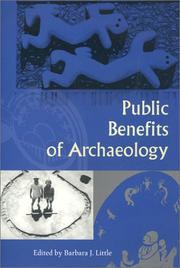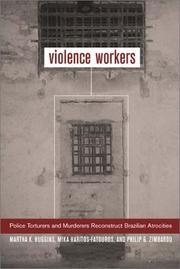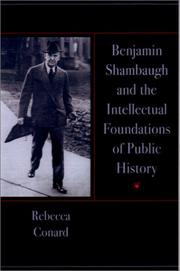| Listing 1 - 3 of 3 |
Sort by
|

ISBN: 0813024552 9780813024554 Year: 2002 Publisher: Gainesville (FL): University Press of Florida,
Abstract | Keywords | Export | Availability | Bookmark
 Loading...
Loading...Choose an application
- Reference Manager
- EndNote
- RefWorks (Direct export to RefWorks)
Archaeology and history --- Archaeology --- Public history --- Community life --- Historic sites --- Social aspects --- Conservation and restoration --- United States --- Antiquities --- Collection and preservation --- Archaeology and history - United States --- Archaeology - Social aspects - United States --- Public history - United States --- Community life - United States --- Historic sites - Conservation and restoration - United States --- United States - Antiquities - Collection and preservation

ISBN: 9786612356865 1282356860 0520928911 1597349798 9780520928916 9781597349796 9780520234475 0520234472 0520234464 9780520234468 6612356863 9781282356863 Year: 2002 Publisher: Berkeley : University of California Press,
Abstract | Keywords | Export | Availability | Bookmark
 Loading...
Loading...Choose an application
- Reference Manager
- EndNote
- RefWorks (Direct export to RefWorks)
Of the twenty-three Brazilian policemen interviewed in depth for this landmark study, fourteen were direct perpetrators of torture and murder during the three decades that included the 1964-1985 military regime. These "violence workers" and the other group of "atrocity facilitators" who had not, or claimed they had not, participated directly in the violence, help answer questions that haunt today's world: Why and how are ordinary men transformed into state torturers and murderers? How do atrocity perpetrators explain and justify their violence? What is the impact of their murderous deeds-on them, on their victims, and on society? What memories of their atrocities do they admit and which become public history?
Torture --- Political atrocities --- Police brutality --- Atrocities --- Brutality by police --- Excessive force used by police --- Excessive use of force by police --- Police use of excessive force --- Use of excessive force by police --- Police misconduct --- Brutalités policières --- Atrocités politiques --- Police violence --- Violence --- 1980s. --- brazil. --- brazilian history. --- brazilian police. --- brazilian. --- contemporary. --- crime. --- criminals. --- cultural history. --- cultural studies. --- execution. --- government. --- masculinity. --- military history. --- military state. --- modern world. --- murder. --- police violence. --- power. --- public history. --- reconstruction. --- social history. --- social studies. --- south america. --- torture. --- world history.

ISBN: 158729401X 9781587294013 0877457891 9780877457893 Year: 2002 Publisher: Iowa City : University of Iowa Press,
Abstract | Keywords | Export | Availability | Bookmark
 Loading...
Loading...Choose an application
- Reference Manager
- EndNote
- RefWorks (Direct export to RefWorks)
Conard draws upon an unpublished, mid-1940's biography by research historian Jacob Swisher to trace the forces that shaped Shambaugh's early years, his administration of the State Historical Society of Iowa, his development of applied history and commonwealth history in the 1910's and 1920's, and the transformations in his thinking and career during the 1930's. Framing this intriguingly interwoven narrative are chapters that contextualize Shambaugh's professional development within the development of the historical profession as a whole in the late nineteenth and early twentieth centuries and
Public history --- Historians --- Applied history --- History --- Historiographers --- Scholars --- Shambaugh, Benjamin Franklin, --- Shambaugh, Benj. F. --- Shambaugh, B. F. --- Iowa --- United States --- IA --- State of Iowa --- Ayova --- Штат Аёва --- Shtat Ai︠o︡va --- Аёва --- Ai︠o︡va --- Айова --- Áawah Hahoodzo --- Iowa osariik --- Αϊόβα --- Πολιτεία της Αϊóβα --- Politeia tēs Aiova --- Estado de Iowa --- Iovao --- Oi-hò-fà --- 아이오와 주 --- Aiowa-ju --- 아이오와 --- Aiowa --- Áyowạ --- Iova --- Aioua --- Айовæ --- Aĭovæ --- Ajova --- Ајова --- アイオワ州 --- Aiowa-shū --- Aiowashū --- アイオワ --- Estado ng Ayowa --- Iowa Eyaleti --- Штат Айова --- Iowa Territory --- Territory of Iowa --- Historiography.
| Listing 1 - 3 of 3 |
Sort by
|

 Search
Search Feedback
Feedback About UniCat
About UniCat  Help
Help News
News